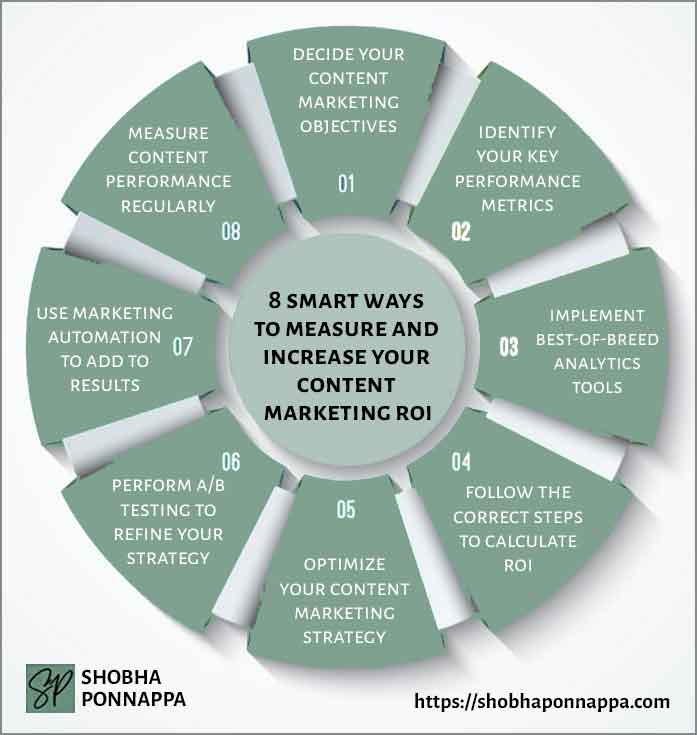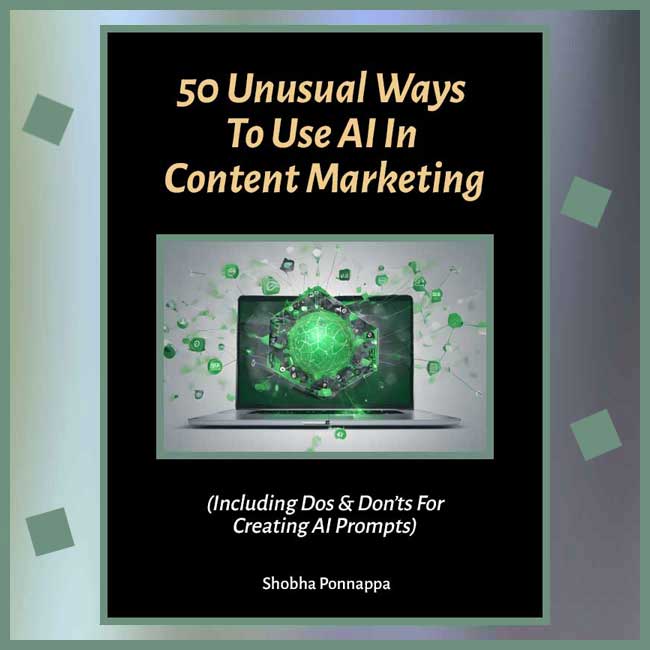
One of the persistent challenges marketers face is determining the return on investment (ROI) of their content efforts. Crafting and distributing valuable content is crucial, but understanding its impact on your bottom line is equally vital.
It’s the key to optimizing your content marketing strategy effectively.
The solution lies in a strategic blend of conventional and unconventional approaches. While familiar metrics like website traffic and lead conversions play their part, venturing into uncharted territories can unveil new avenues for success.
In this blog post, we’ll explore how to measure and increase content marketing ROI, urging you to embrace both the tried-and-true and the unexpected for a well-rounded strategy.
Measuring and increasing your content marketing ROI is not an option; it’s a necessity in today’s fiercely competitive digital landscape. Every dollar spent on content creation and distribution should yield tangible results, and understanding the impact of your efforts is paramount.
It’s a strategic imperative that allows you to refine your content marketing strategy, allocate resources more efficiently, and ultimately, drive better business outcomes. Without a clear grasp of your ROI, you’re left in the dark, making critical marketing decisions blindly.
By delving into the metrics and analytics, you uncover insights into what works and what doesn’t, enabling you to fine-tune your approach for maximum effectiveness.
It’s the difference between shooting in the dark and hitting your target with precision. In this era of data-driven marketing, measuring and enhancing your content marketing ROI isn’t merely an option—it’s the linchpin of your success.
To increase your content marketing ROI, it’s imperative to leverage a combination of proven and rare ideas. This strategy aligns with my “Unusual By Strategy” forte, emphasizing the need to step beyond the ordinary.
Conventional methods have their merits, providing a solid foundation for content marketing efforts. They offer reliability and established best practices that shouldn’t be dismissed. However, the competitive digital landscape demands innovation and differentiation.
That’s where the rare, offbeat ideas come into play. They inject creativity and uniqueness into your content strategy, setting you apart from the crowd. The mandate here is not to rely solely on either conventional or unconventional approaches, but to strike a balance between the two.
By integrating time-tested methods with fresh, unexpected ideas, you can create a dynamic content marketing strategy that not only meets your goals but also surprises and engages your audience. It’s the synergy of the conventional and the unusual that propels your ROI to new heights.
Leveraging my 40+ years’ experience as a Brand Content Strategist with a penchant for the unusual, I’ve curated eight powerful ideas that not only encompass time-tested approaches to measure and increase content marketing ROI but also infuse a unique twist for maximum impact.
These ideas encapsulate the essence of a balanced strategy—where conventional wisdom meets the unexpected, transforming your content marketing endeavors into ROI-boosting success stories.

Deciding your content marketing objectives is the fundamental pillar upon which your entire content strategy rests. It’s akin to setting the destination before embarking on a journey, and it’s paramount for measuring and increasing your content marketing ROI.
Consider a hypothetical example: Suppose you’re a tech startup aiming to establish thought leadership in the industry. Your content marketing objective should revolve around creating insightful, informative content that positions you as an authority. By defining this objective, you establish a clear direction for your content creation efforts.
Each piece of content, whether it’s a blog post, whitepaper, or video, now has a purpose—to enhance your industry reputation. Measuring ROI becomes more straightforward as you track metrics like website traffic, engagement, and leads generated from this thought leadership content.
Without a well-defined objective, your content efforts lack focus, making it challenging to evaluate their impact on your business goals. Therefore, setting clear content marketing objectives serves as the foundation for a successful ROI-driven strategy.

Consider the idea of the “Quantum Objective Leap (QOL)” into your content strategy by infusing a dose of unpredictability into your content marketing objectives. Rather than setting rigid goals, periodically introduce an element of surprise. This could involve selecting a wildcard objective, perhaps inspired by a spontaneous brainstorming session or a trending topic.
For the tech startup example, instead of solely aiming for thought leadership, apply QOL by designating one month as “The Month of Innovation.” During this period, the objective could shift towards encouraging disruptive thinking, leading to the creation of unconventional content that challenges industry norms. QOL not only keeps your content strategy fresh but also fosters creativity, potentially unearthing new avenues for ROI.
Identifying your key performance metrics is an elemental stride in any effective content marketing strategy aimed at measuring and amplifying ROI. Picture this hypothetical scenario: You manage the digital presence of an e-commerce fashion brand.
To gauge the success of your content efforts, it’s indispensable to pinpoint the most pertinent metrics. For instance, if your objective is to boost sales through content, then conversion rate, average order value, and revenue per visit become your North Stars.
These metrics reveal the real impact of your content on the bottom line. On the other hand, if your focus is on brand awareness and engagement, metrics like website traffic, bounce rate, and social media shares take precedence.
Identifying these metrics not only provides clarity on what success looks like but also facilitates targeted improvements. It ensures that your content marketing strategy remains aligned with your goals and, ultimately, leads to a measurable increase in ROI.

Consider the “Dynamic Metric Shuffle (DMS)” to your content strategy toolkit. With DMS, periodically replace one or more key performance metrics with unexpected counterparts, fostering adaptability and innovation. For our e-commerce fashion brand, consider temporarily substituting the conventional “Conversion Rate” metric with “Social Sentiment Score.”
This twist encourages a fresh perspective, emphasizing not just sales but also the emotional resonance of your brand within the audience. As a result, you may discover novel ways to influence customer sentiment and engagement, potentially leading to indirect but valuable ROI gains. DMS keeps your team agile, prompting creative thinking, and expanding your content strategy’s potential for unanticipated successes.
Leveraging best-of-breed analytics tools is a cornerstone of an effective content marketing strategy focused on measuring and amplifying ROI. Imagine you manage the digital presence of an online fitness platform. The ability to track and analyze user behavior, conversion paths, and content engagement through analytics tools is paramount.
These tools, such as Google Analytics and marketing automation platforms, equip you with actionable insights into your audience’s interactions with your content. By examining metrics like user demographics, traffic sources, and content performance, you can discern what resonates with your audience and what doesn’t.
This information allows you to refine your content marketing strategy continuously, optimizing for higher ROI. Moreover, analytics tools empower you to experiment with different content approaches, A/B testing, and personalization, all with the goal of enhancing your content’s impact on your bottom line.
The implementation of these tools not only ensures data-driven decision-making but also positions your content marketing efforts for sustained growth and success.

Consider the “Predictive Analytics Alchemy (PAA)” into your content strategy arsenal. PAA involves leveraging advanced predictive analytics algorithms within your analytics tools to forecast future content trends and audience behaviors. For our online fitness platform, imagine using PAA to anticipate upcoming fitness fads and users’ workout preferences. By analyzing historical data and user interactions, the platform can proactively create content and workout plans aligned with these predictions.
This not only positions the platform as a trendsetter but also attracts users seeking the latest fitness trends. PAA transforms your content strategy from a reactive approach to a proactive one, where you stay one step ahead of the competition and consistently deliver content that resonates with your audience, ultimately boosting ROI through increased engagement and subscriptions.
Mastery of the precise steps for calculating ROI remains an indispensable pillar of content marketing’s efficacy, essential in the quest to measure and elevate your ROI. Let’s consider a hypothetical scenario: You manage the online presence of a gourmet cooking blog.
To assess the ROI of your content efforts, it’s crucial to methodically compute it. Begin by calculating the costs incurred in content creation, promotion, and distribution. Simultaneously, quantify the benefits, which might encompass increased website traffic, social media engagement, and affiliate marketing earnings.
Divide the net gain by the initial investment, then multiply by 100 to express it as a percentage. This calculated ROI provides an unequivocal picture of your content’s profitability.
Accurate ROI calculation not only guides resource allocation but also informs strategic decisions. By refining content based on these findings, you can progressively maximize ROI, forging a path to sustainable content marketing success.

Consider the “ROI Time Capsule (RTC)” as an unconventional addition to your content strategy. The RTC involves not only calculating the immediate ROI of your content but also projecting its long-term impact. For the gourmet cooking blog, envision using the RTC to estimate how a single, well-crafted recipe post may continue to attract readers and generate affiliate marketing income years into the future.
By incorporating future value predictions, you gain a deeper understanding of the enduring impact of your content. This approach encourages investment in evergreen content that delivers sustained ROI, rather than solely focusing on short-term gains. The RTC enhances your content strategy by illuminating the hidden, long-tail ROI potential and guiding your content creation towards lasting value.
Efficiently optimizing your content marketing strategy remains a steadfast directive in the relentless pursuit of measuring and advancing your ROI. Let’s envision a hypothetical scenario: You oversee the digital presence of a travel agency specializing in adventure tours.
The constant flux of consumer preferences and search engine algorithms necessitates an agile content strategy. To enhance ROI, it’s imperative to scrutinize your strategy continually. This involves refining your approach based on performance data, audience feedback, and market trends. Suppose a particular blog series about remote hiking trails garners high engagement and bookings.
In that case, your strategy may shift towards creating more similar content, focusing on the elements that resonate with your audience. Conversely, if a social media campaign falls flat, you adapt by reallocating resources to more fruitful channels.
This iterative process of optimization molds your content marketing strategy into a dynamic force capable of delivering consistent, measurable ROI growth.

Consider injecting an element of serendipity into your content strategy with the “Serendipitous Story Spin (SSS).” Instead of relying solely on data-driven optimization, periodically introduce a random, offbeat element into your content creation process. For the travel agency, consider letting a randomly selected staff member curate a blog post about their favorite travel memory, unrelated to current trends or keywords.
The SSS encourages creativity and unpredictability, potentially unearthing unexpected gems that resonate deeply with your audience. By embracing randomness alongside data-driven optimization, you open the door to delightful surprises that enhance engagement and ROI, proving that sometimes, the most unconventional ideas yield the most remarkable results.
Harnessing the power of A/B testing is an enduring practice that serves as a linchpin in the journey to evaluate and elevate your content marketing ROI. Picture this scenario: You manage a lifestyle blog focused on wellness and healthy living.
In the realm of content marketing, A/B testing offers a scientific approach to refining your strategy. By systematically comparing two versions of a webpage, email campaign, or social media post, you gain insights into what elements resonate most with your audience.
For instance, A/B testing can unveil whether a particular headline drives more clicks, if a specific call-to-action button enhances conversion rates, or if the timing of your email newsletter impacts engagement. Armed with these findings, you can make data-backed adjustments to your content marketing strategy.
By continuously experimenting and optimizing based on A/B test results, you not only fine-tune your approach but also amplify ROI as you consistently deliver content that resonates with your audience’s preferences and behaviors.

Consider introducing the “Quantum Variation Quest (QVQ)” into your A/B testing regimen, adding a twist of unpredictability. Alongside your controlled A/B tests, periodically launch a ‘Quantum Variation’—a completely random, offbeat content variant unrelated to your standard testing parameters. For the lifestyle blog, this could mean an occasional post on an entirely unexpected topic, like extreme sports in contrast to wellness.
The QVQ encourages creative experimentation and harnesses the potential of serendipitous discoveries. While traditional A/B tests optimize known factors, the QVQ keeps your content strategy dynamic, unearthing unconventional successes and inspiring fresh directions that, on occasion, may lead to unexpected spikes in engagement and ROI. It’s a daring fusion of the structured and the spontaneous, where calculated precision meets creative chaos, amplifying your content marketing strategy’s potential.
Integrating marketing automation into your content strategy is a time-honored practice that significantly contributes to the endeavor of gauging and enhancing content marketing ROI. Imagine managing the digital presence of an e-commerce platform specializing in artisanal handmade crafts.
In the world of content marketing, marketing automation tools serve as invaluable allies. They streamline repetitive tasks such as email marketing, social media posting, and lead nurturing, allowing your team to focus on strategic content creation and optimization.
For instance, you can set up automated email campaigns that trigger based on user behavior, sending personalized recommendations or follow-ups. Such tailored interactions increase user engagement and conversion rates, directly impacting ROI. Moreover, marketing automation provides a wealth of data insights, enabling you to track user journeys, identify bottlenecks, and optimize content delivery.
In essence, it empowers you to deliver the right content to the right audience at the right time, significantly augmenting your content marketing ROI through enhanced efficiency and effectiveness.

Consider introducing the “Autonomous Creative Catalyst (ACC)” to your marketing automation arsenal. This unconventional approach involves periodically allowing your marketing automation system to generate and deploy content autonomously, without human intervention. For the artisanal handmade crafts e-commerce platform, ACC could entail automated creation and distribution of short, artistic videos showcasing the crafting process.
By relinquishing some control to automation, you may uncover fresh, unexpected content ideas and creative approaches. The ACC sparks innovation, opening doors to unconventional content that surprises and engages your audience. It’s a daring fusion of technology and creativity, where the machine collaborates with human ingenuity, potentially leading to remarkable ROI gains by delivering content that stands out in a crowded market.
Consistently measuring content performance is an unwavering pillar of content marketing’s ability to gauge and amplify ROI. Consider this scenario: You oversee the digital presence of a tech news website. In the realm of content marketing, regular performance measurement is akin to an ever-watchful compass.
By routinely assessing the metrics and KPIs associated with your content, you gain real-time insights into its effectiveness. For instance, you can track the performance of individual articles, monitoring metrics like page views, time on page, and click-through rates.
If you notice that articles covering the latest product launches consistently attract higher engagement, you can adapt your content strategy accordingly, producing more of such content to maximize ROI. Moreover, regular performance measurement enables you to detect trends, identify content gaps, and make data-driven adjustments.
This iterative process keeps your content marketing strategy agile and responsive, ensuring that you continually optimize content for the best possible ROI.

Consider introducing the “Sentimental Content Sonar (SCS)” to your content measurement routine. SCS involves periodically gauging not just quantitative metrics but also the sentiment and emotional resonance of your content among your audience. For the tech news website, this entails conducting sentiment analysis on user comments, social media interactions, and email feedback related to specific articles.
By understanding not only how many people engage with your content but also how it makes them feel, you can fine-tune your content strategy to elicit desired emotional responses. SCS helps you craft content that not only performs well quantitatively but also forges deeper connections, potentially leading to increased loyalty, advocacy, and ultimately, higher ROI through a more engaged and emotionally connected audience.
Regular measurement Is paramount: Consistently measuring and analyzing the performance of your content marketing efforts is crucial. It provides real-time insights into what’s working and what isn’t, allowing you to make data-driven decisions for optimization.
Automation enhances efficiency: Integrating marketing automation tools can significantly boost the efficiency of your content marketing strategy. It streamlines repetitive tasks, personalizes user experiences, and helps in targeting the right audience with the right content at the right time.
Embrace unconventional approaches: Don’t shy away from adding a touch of creativity and unpredictability to your content strategy. Unusual enhancements like the Sentimental Content Sonar or the Quantum Variation Quest can lead to unexpected successes and set you apart in a competitive landscape, ultimately elevating your content marketing ROI.

"As a Content/Brand Specialist, and SEO/UX Writer, I can help transform your brand's online presence. I can lift it with innovative ideas to take it to an enviable position. Let's collaborate to create a captivating brand story, engage your audience, boost your online visibility, and increase your ROI. Take the next step towards your brand content success and contact me today."
Shobha Ponnappa
I Bring You:
Content Marketing That’s “Unusual By Strategy” … Tips, Tricks, Tactics, Techniques, Trends, Training.
Get my weekly ContenTracker Newsletter packed with loads of content marketing ideas – proven and unusual.
Get a free download of my ebook on “50 Unusual Ways To Use AI In Content Marketing” … and transform your success.

Just fill in the form to join my community … we have big and small brands for company. You’ll stay on the speedway to growth.
KEY TOPIC CATEGORIES COVERED ON THIS SITE:
COPYRIGHT © 2025. SHOBHAPONNAPPA.COM. ALL RIGHTS RESERVED.

Just fill in this form and get this awesome guide via email. Plus … each fortnight you’ll receive my Brand Reframe Newsletter that brings you smart insights, distilled thinking, and focused brand momentum.